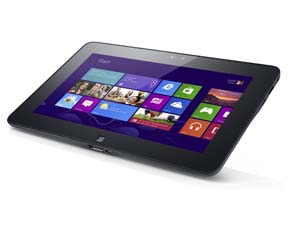Dell has launched a range of devices running Windows 8, including a 10-inch tablet, which it claims will fit "easily into current IT environments."
The company said the new range of Windows 8 devices could solve issues with the consumerisation of IT.

Over the last two years IT departments have been fighting a battle to retain control of desktop IT, while staff have brought in their own iOS and Android devices. With Windows 8, PC manufacturers like Dell are hoping to convince IT departments that they have a viable alternative to letting staff bring their own devices to work (BYOD). Industry experts believe BYOD can lead to an uncontrolled, insecure environment and can potentially increase support costs.
The Dell Latitude 10 tablet will support existing Microsoft applications. The 725g device features a swappable battery and security options from Dell, including the Dell Data Protection and Encryption software, which encrypts all data on the hard drive to and USB memory cards that are plugged in.
It comes with 2 GB of memory and uses an Intel Atom processor, which means it will ship with the full version of Windows 8, rather than the RT (light) version of Windows 8 for ARM devices. It includes a USB 2.0 slot as well as an SD memory card reader.It supports keyboard and mouse and docking station, allowing the tablet to become a fully functional desktop PC, when users are at their desk.
To improve security the Dell tablet can use an optional fingerprint or smartcard reader. Sectors such as healthcare, government and education, which require integration with specific industry software and additional levels of security, will be able to add these features from January 2013, Dell said.
Dell also unveiled its first enterprise-class Ultrabook as well as an All-in-One PC, both running Microsoft's newest operating system, Windows 8, which is set to be released 26 October.
The company recently announced its consumer offering, the XPS range including laptops which will feature Windows 8 and a tablet which will run on the Windows 8 RT operating system.
According to Dell's recent Evolving Workforce Research report nearly 60% of employees feel work would be more enjoyable if they had a say in the technologies they used, while 60% feel they would be more productive with better IT resources.
"There's a middle ground where you give the tools that are needed and deal with the security and integration issues head on to meet senior employee needs."
"If you solve the problem, the need for BYOD goes down," said Kirk Schell, vice president, computing products, Dell.
Schell added that the full Windows 8 operating system easily integrates into the enterprise IT infrastructures. Even if a company is not intending to upgrade its PCs to Windows 8 come its release in October, a Windows 8 tablet sits seamlessly among other Windows products.
Steve O'Donnell, consultant and analyst at S1ned said that companies tend to deny there is a problem with BYOD, leading to employees bringing in their own devices, which then burdens the security model and IT support.





